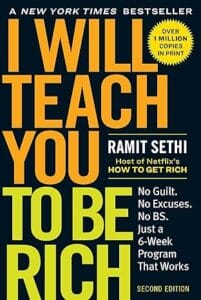7 Personal Finance Books actually worth reading (+ key takeaways summarized)


Today I’m sharing seven personal finance books I think are worth reading. And beyond just a quick summary, I'm also sharing a couple of the key takeaways you'll find in each book. Let's get right into it:
Book 1: I Will Teach You to Be Rich by Ramit Sethi
Summary:
This is my own book, but I wouldn't have written something that didn't deserve to be on this list. And with over 1 million copies in print and both editions making the New York Times Bestseller list, I'm not the only one who thinks it.
"I Will Teach You To Be Rich" isn't your typical personal finance guide—it's a practical 6-week program designed to help you develop the skills and mindset necessary to manage your money effectively.
I’ve packed it with step-by-step strategies to help you achieve financial freedom without sacrificing the things you love.
You can also get the (separate) I Will Teach You To Be Rich Journal which has writing prompts and exercises to help you set goals, create a budget, and develop better habits.
Key Takeaways:
Systems for Automating Finances:
Managing your money should be simple. That’s why I absolutely love automating financial tasks like bill payments, savings, and investments. By setting up automatic transfers and payments, you can reduce your mental load and ensure consistency in your financial habits.
Strategies for Saving, Investing, and Spending:
I recommend setting up high-interest savings accounts and automating contributions to make saving effortless. When it comes to investing, I’m a big advocate for low-cost index funds and compound interest. And let’s not forget about spending—in this book, I’ll show you how to spend consciously and prioritize expenses that truly matter to you.
Psychological Insights into Money Management:
Money is about mindset. In my book, I dive deep into the psychological aspects of money management. From overcoming guilt to building healthy financial habits, I’ll guide you through understanding your personal money scripts and shifting your attitude toward money.
Interested? You can read the first chapter for free – just tell me where to send it:
Book 2: The Bogleheads’ Guide to Investing
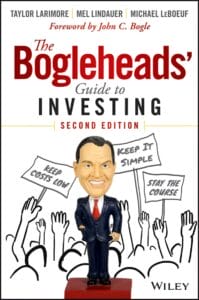
Summary:
“The Bogleheads’ Guide to Investing” is a must-read for anyone serious about mastering their finances. This book, rooted in the investment principles of John Bogle, founder of Vanguard, is like having a personal mentor guiding you through the world of investing.
Written by Taylor Larimore, Mel Lindauer, and Michael LeBoeuf—seasoned investors and core members of the Bogleheads community—it delivers clear, actionable advice on building and managing a low-cost, long-term, diversified portfolio (something I truly believe in).
Whether you’re just starting out or you’ve been investing for years, this book makes complex concepts easy to understand and apply.
Key Takeaways:
Importance of Low-Cost Index Funds:
- Broad Market Exposure at Minimal Cost: Investing in low-cost index funds is crucial. Why? Because they give you broad market exposure without the high fees that eat into your returns.
- Higher Net Returns Over Time: Keeping fees and expenses low is one of the smartest moves you can make. Over time, these savings significantly boost your net returns.
- Examples: Take a look at the Vanguard Total Stock Market Index Fund and the S&P 500 Index Fund. They’re well-known for their low costs and reliable performance. These are classic, dependable choices for any investor.
Strategies for Long-Term Investing:
- Diversified Portfolio: One of the best ways to secure your financial future is by maintaining a diversified portfolio. Don’t let market fluctuations scare you into making rash decisions.
- Consistency and Patience: Remember, success in long-term investing is all about consistency and patience. It’s not about timing the market, but about time in the market.
- Specific Strategies: Strategies like dollar-cost averaging and the buy-and-hold approach can help you mitigate risk and benefit from market growth over time. Stick with these, and you’ll be in a strong position.
Practical Advice on Asset Allocation and Diversification:
- Managing Risk Through Asset Allocation: The book offers practical guidance on how to spread your investments across different asset classes to manage risk effectively.
- Reducing Overall Portfolio Risk: Diversification is key to reducing the overall risk of your investment portfolio.
- Examples: The book provides recommended asset allocation models tailored to various risk tolerances and investment horizons. These models help you create a balanced, resilient portfolio.
Book 3: A Random Walk Down Wall Street by Burton Gordon Malkiel
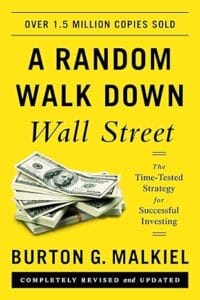
Summary:
“A Random Walk Down Wall Street” is an absolute classic in personal finance and investing. Burton Malkiel’s book is a deep dive into the inner workings of the stock market and the various investment strategies out there.
What’s particularly fascinating is his exploration of the “efficient market hypothesis”. This theory suggests that stock prices incorporate all available information, making it tough to consistently beat the market.
If you’re serious about understanding the fundamentals of investing and why a straightforward approach often wins out, this book is a must-read. It’s packed with insights that can help you navigate the financial landscape with confidence.
Key Takeaways:
The Concept of Efficient Markets:
The efficient market hypothesis (EMH) says that stock prices reflect all available information. Basically, it means trying to consistently outperform the market through expert stock picking or timing is impossible.
The Benefits of Passive Investing:
Malkiel is a big fan of passive investing, like using low-cost index funds. He argues that active management usually doesn’t beat the market over time. This fits perfectly with the idea of achieving steady, long-term financial growth without the stress of constant market maneuvers.
Techniques for Building a Diversified Portfolio:
Diversification is crucial in minimizing risk and maximizing returns. Malkiel emphasizes spreading your investments across different asset classes and regions to keep your portfolio balanced and resilient. This is a core strategy for anyone serious about long-term investing success.
Book 4: The Millionaire Next Door by Dr. Thomas J. Stanley and Dr. William D. Danko
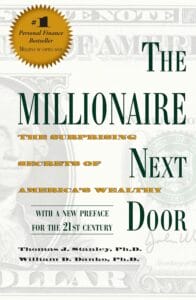
Summary:
“The Millionaire Next Door” is a game-changer in understanding how real millionaires live. Dr. Thomas J. Stanley and Dr. William D. Danko did a deep dive into the habits of America’s wealthy, and the findings will surprise you.
Forget the flashy stereotypes—this book shows how the truly rich acquire and keep their wealth with down-to-earth lifestyles and smart financial habits. It’s a must-read if you want to learn what it really takes to become wealthy and stay that way.
Key Takeaways:
Characteristics of Typical Millionaires:
Typical millionaires aren’t what you might expect—they’re frugal, hardworking, and live below their means. They exhibit traits like discipline, modesty, and a focus on long-term financial goals.
The Importance of Frugality and Living Below One’s Means:
Frugality is key to wealth accumulation. Many millionaires prioritize saving and investing over flashy spending. Living below one’s means is crucial for financial stability and growth.
Strategies for Accumulating Wealth Over Time:
The book offers practical strategies like budgeting, disciplined saving, and smart investing. Financial planning and setting long-term goals are essential for building and maintaining wealth.
If you’ve read this far, you’d LOVE my New York Times Bestselling book
You can read the first chapter for free – just tell me where to send it:
Book 5: The Smartest Investment Book You'll Ever Read by Daniel R. Solin
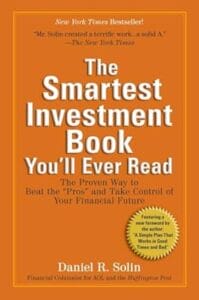
Summary:
In “The Smartest Investment Book You’ll Ever Read”, Daniel R. Solin breaks down complicated investment jargon into clear, actionable advice, perfect for both rookies and seasoned investors alike.
With an emphasis on simplicity and effectiveness, Solin’s book is like a roadmap to financial success, accessible to everyone.
Key Takeaways:
The Benefits of Index Funds:
Solin sings the praises of index funds for their low fees, wide diversification, and consistent returns. They've proven to outshine most actively managed funds in the long run.
Simplified Strategies for Successful Investing:
Keep it simple, he says. Diversify your portfolio and keep feeding your investments regularly. Think long-term and steer clear of trying to time the market. These straightforward tactics pave the way for steady, sustainable growth.
Common Investment Pitfalls to Avoid:
Don’t fall into the traps of trying to outsmart the market, chasing the latest fads, or paying hefty fees for active management. Solin’s advice? Dodge these pitfalls to maximize your investment gains.
Book 6: Stocks for the Long Run by Jeremy Siegel
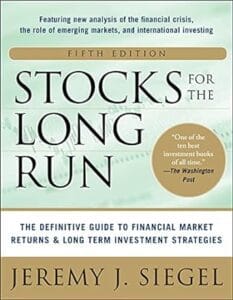
Summary:
“Stocks for the Long Run” by Jeremy Siegel is a classic. Jeremy Siegel, a respected finance professor, offers thorough research and crystal-clear explanations of the long-term advantages of investing in the stock market.
Whether you’re a seasoned investor or just starting out, this book is packed with valuable insights that will steer you on the right path.
Key Takeaways:
Historical Performance of Stocks:
Siegel showcases stocks’ consistent outperformance compared to other asset classes throughout history. His analysis, peppered with key statistics and historical anecdotes, sheds light on the enduring resilience and growth potential of the stock market.
Strategies for Long-Term Investing:
Siegel advocates for long-term investment strategies, emphasizing the merits of maintaining a diversified stock portfolio while underscoring the virtues of patience and discipline. His insights offer readers actionable tactics for managing risk and optimizing returns over the long haul.
The Power of Compounding Returns:
Delving into compounding returns, Siegel illustrates how reinvesting dividends and allowing investments to grow can result in exponential wealth accumulation. Through tangible examples and detailed calculations, he vividly demonstrates the transformative impact of compounding on investment performance.
Book 7: The Opposite of Spoiled by Ron Lieber
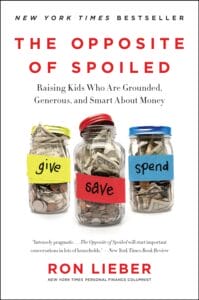
Summary:
“The Opposite of Spoiled” by Ron Lieber takes parenting to another level. Drawing on his years of expertise as a personal finance columnist for The New York Times, this comprehensive guide dives deep into practical strategies for instilling essential money skills in our children—because it’s never too early to teach the youngins about financial responsibility.
If you have kids (or know people with kids who might benefit from this kind of wisdom), teaching them about money can enhance their financial habits and understanding.
Key Takeaways:
Practical Advice on Allowances, Saving, and Charitable Giving:
Lieber provides insights into using allowances to teach financial responsibility, including the amount and frequency of giving. Strategies for teaching children about saving and setting financial goals are outlined, along with the importance of charitable giving.
How to Instill Financial Values in Children:
He discusses important methods for teaching children the value of money and the concept of earning, alongside techniques for budgeting and distinguishing needs from wants. Family activities and discussions are suggested to reinforce these financial values effectively.
The Importance of Financial Education from a Young Age:
Lieber stresses the significance of starting financial education early, citing long-term benefits such as improved money management skills and financial independence. Research and examples from the book also illustrate the positive outcomes of early financial literacy.
Conclusion
Every book I’ve listed in this blog is rich in practical advice and proven techniques to help you achieve financial freedom.
Whether you’re looking to supercharge your investment portfolio, sharpen your saving strategies, or really get into the mindset behind financial decisions, there’s something here for you. If you're hungry for more of my favorite reads, check out my list of 50 books I recommend!
